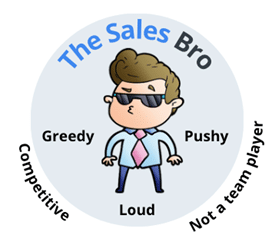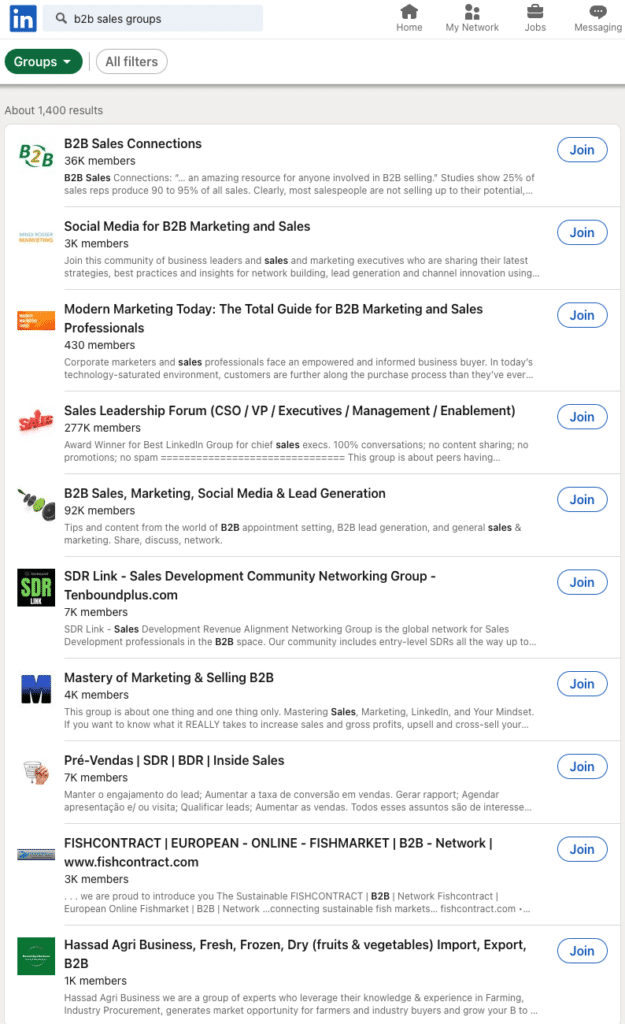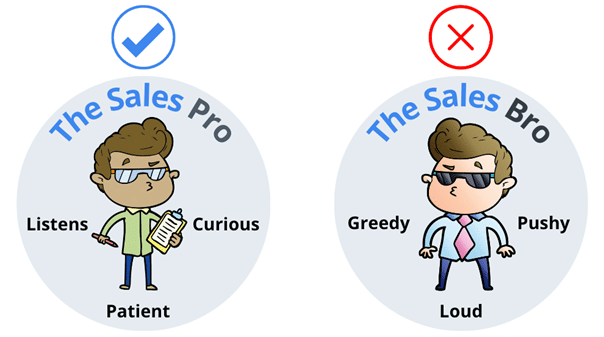Back in 1963, Joseph Samuel Girard started a sales streak that would go on until 1978. Credited as the greatest salesperson of all time, Joe sold 13,001 cars in those 15 years. But how?
You may not be looking to sell 13,000 units of your product but the underlying principles of being successful are the same. A huge challenge is that there are many negative biases that prospective customers have of salespeople in general.
So whether you’re a B2B sales rep looking to discover secrets to boost your numbers or a sales manager looking for talent to put together a quota-smashing team, we’re about to reveal the (not so) secret ingredients that make up a great salesperson.
Breaking Down the Salespeople Stereotypes
Like the rest of us, every salesperson has a job to do and it’s honestly not an easy one. Not only do they have to sell you a product or service, but they also have to figure out how to overcome any stereotypes or prejudices you already have of them.

One of the most common stereotypes is the “Sales Bro”. They are insanely competitive and definitely not team players—mostly perceived as loud, pushy, and greedy.
Another stereotype people have is that great salespeople are born, not made. Of course, some have the right personality fit to go into Sales, but that won’t help them be successful in the long run.
But how can salespeople get their prospects to see past all of that, build trust and win the deal? Let’s take a look:
The Top 7 Traits of Great Salespeople
Successful salespeople aren’t born, they’re made. So what exactly should you be aiming for? There is a lot of data out there, so we interviewed sales leaders at Dealfront to ask them what they think the top traits are that make a great salesperson. Do you think you can guess what number one is before you get to the end of the list?
7. Be Authentic
People love to be wowed by both a great sales pitch and the product and service that will be the solution they need. But sometimes, neither the pitch, the person nor the offering is what they are presented as.
Carolina Bräuninger, a Senior Account Executive at Dealfront, knows a thing or two about bringing her authentic self into every call.
“Believing in who you are and the product or service you’re selling is so important. If you can’t believe in that, how can you expect the person you’re giving your pitch to, to believe in you? You have to learn to communicate with so many different kinds of people—knowing who you are and what you represent is the foundation of that.”
Carolina is active on LinkedIn, runs the Girl in Sales podcast, and is a brand ambassador of the SDRs of Germany group. She says that all of these things, while not directly related to Dealfront, make up who she is. It’s 100% her brand. When people interact with her outside of the context of her job they are getting the same person that she’s bringing to a cold call.
Authenticity goes hand in hand with reliability. Be who you say you are, and do what you say you’re going to do. This encourages authenticity on the part of your prospect too!
6. Be Persistent but Patient
90% of salespeople give up after four sales calls which is incredibly fast considering that the average sales cycle length for a B2B company is around 102 days! A great salesperson has to dig in for the long game.
Being persistent is the other side of the “pushy” coin and great salespeople know how to make that work for them. They do their research so they can personalize the outreach for each prospect. You’re selling a product, yes, but you’re also selling an experience that the prospect will never forget. You’re trying to build trust during the first stages of the sales cycle, not actually make a sale.
The sales rep must learn something new about the prospect’s needs with each contact and leverage that knowledge to build the bridge to that final sale.
5. Be Ethical
Do you remember the section on stereotypes? Well, another negative bias people have against salespeople is that they are unethical. Alicia Murphy, a Product-Led Growth (PLG) Manager at Dealfront said that one of the best ways to build trust is to be upfront when your product isn’t the solution the prospect needs.
“When you sit in a discovery call with the prospect and they’re describing their pain points to you, you have to be ready to say ‘Hey, I’m glad you took the time to talk to me about what your needs are, but I don’t think we’re the solution for you.’”
Alicia’s colleague Dipak Vadera, Director of Product Led Growth Sales, agreed and added “Don’t sell for the sake of selling. You need to be customer-centric and that means recognizing that you might not be a match to help them. Everything else is simply unethical.”
4. Be Self-Motivated
Having pressure to meet quotas and close deals can be counterproductive to motivation. Successful salespeople know that external factors aren’t what pushes you forward, it’s your inner fire that propels you toward success.
Of course, some teams compete among themselves but if being better than your colleague is what motivates you, you won’t have sustained success throughout your career. Instead, let your motivation drive you to become a better version of yourself. This leads us directly to the next trait:
3. Be Curious and Willing to Learn
Self-motivation goes hand in hand with being curious and having the willingness to learn. When you’re driven to continuously top yourself, you can never be satisfied by resting on your laurels. There is always something new to learn so you have to be willing to learn it.
Are you curious about why a prospect did or didn’t choose you? Ask! Don’t assume. Join a sales group on LinkedIn to share best practices that you can you can already implement on your next call.

A selection of B2B Sales-related LinkedIn Groups
Get book recommendations, listen to podcasts or check out YouTube channels with engaging sales content and tips.
There is a treasure trove of information out there that’s available 24/7—you only have to go out there and use it.
2. Be Resilient and Have Grit
Quite often, people use resilience and grit interchangeably but they’re not the same. You can have one without the other, but successful sales representatives have both! You often deal with resistance and rejection. Being resilient and bouncing back from a negative experience so you can move towards your next goal is also part of being persistent.
Grit is the perseverance to go after something by putting in the work over an extended period of time. So, your prospect said they can’t talk to you today? Don’t feel dejected and don’t suggest a time—let the customer lead by suggesting a new date and time. You’re putting the next step in their hands, taking away the pressure for them to agree to your timeline.
Our tip: Use tools like Calendly so that your prospect can select a date and time in your calendar that suits them best!
1. Be a Good Listener
Are you surprised by the number one choice among the sales professionals we polled? We’re not! Every single one of them chose this trait as the "must have" among all the traits. And it is for a very good reason.
If you think back to the stereotypes, many people believe that successful salespeople have to be good at talking.
Well, yes and no.
Throughout this piece, we've talked about building stronger relationships with your potential clients and honing strong communication skills as essential. Communication is a two-way street and making your potential customer feel heard isn't about your sales quotas.
Being a good listener is often tied to having empathy which is part of a package of soft skills that can take you from being a good salesperson to being a great one. Putting the customer at the center of your sales strategy is something that every B2B salesperson should strive for. If you're listening, you're learning.
How to Train for Success
If salespeople are made, not born, what kind of training should be in place to ensure that the rep has all the tools to close the deal? Forbes says that 55% of salespeople lack basic sales skills when they begin their sales career. That means, you have to have an onboarding plan in place to get people up to speed.
According to the RAIN group, it takes an average of 15 months to onboard a top performer! But it’s essential that ongoing training takes place as well. Another study shows that 84% of sales training is forgotten in the first three months. So create a dynamic training system to keep the quality of your sales team consistently high.
Align on best practices, product/service knowledge and goals to make sure every single one of your sales reps goes into a call on equal footing. The bottom line is that companies that invest in training are 57% more effective than their competitors!
What a Great Sales Rep Looks Like to a Trainer
We asked Antina Sommer, Senior Sales Enablement Manager and Sales Trainer for Dealfront, what the top 3 salespeople on the team have in common:
- They’re focused on the why of what they're trying to accomplish. Not only as an individual but as a team. Why are they in Sales? If it’s for the commissions, it’s for the wrong reason. Ultimately what you’re trying to do is to help people find solutions to their problems.
- They’re hardworking. They are willing to go that extra mile for their customers and themselves. When others have long since given up, they are still trying to go after the prize. They’re not trying to be better than everyone else, they’re trying to be better than they were yesterday.
- They ask questions! No matter how much experience or success a sales rep may have, they should stay curious and continue to learn. If they’re new to Sales, they should sit in on calls as often as possible. Salespeople should always ask questions of prospective customers. It’s never as simple as just knowing they need a service or solution. Why do they need it? How will they benefit from it? What are the outcomes they can expect?
“Getting people to focus on their why, showing them how to work hard on their craft and reminding them to always ask questions are simple concepts to get across and train. But, our top 3 high-performing reps also have a presence and a strong sense of self. That’s not really something you can train but comes from doing the actual work once they've mastered the three things I mentioned.”
Conclusion: Listen, Learn and be Memorable
Being the salesperson that helps break the "pushy, greedy, loud" stereotype takes time, effort, and a good ear. Of course, people want to find the thing that helps solve their pain point, but how they get there is just as important. The customer is always on a journey with you, making that journey a comfortable one is up to you!
Be the Sales Pro and not the Sales Bro!

Learning to listen and putting your customer at the center of everything is the most important, but our experts also agree on one thing: Don’t forget to have fun and don’t take yourself too seriously!
So, how did Joseph Samuel Girard sustain his success over such a long period of time? He sent Christmas cards to every single customer, every year. The seemingly simple gesture ensured that at the end of the year, Girard would be associated with good feelings, making him memorable to his customers. Leave your potential customers with the feeling that you care about what they care about and you’ll go from good to great in no time.
